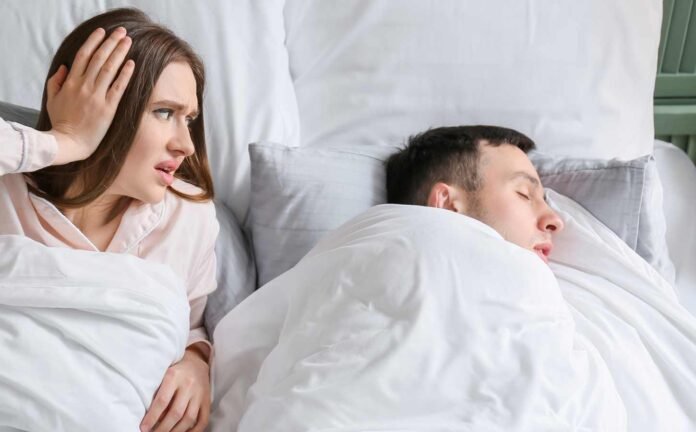Sleep talking, also known as somniloquy, is a phenomenon that occurs when a person talks during their sleep without being aware of it.
Sleep talking is a common occurrence, with approximately 50% of people experiencing it at some point in their lives. While it is usually harmless and does not require treatment, it can be a cause of embarrassment or concern for some individuals.
Sleep talking can range from simple sounds and mumbles to full sentences and even conversations. It can occur during any stage of sleep, but is most common during the deeper stages of non-REM sleep. It is more prevalent in children and young adults, but can occur at any age. The content of sleep talking can vary from nonsensical phrases to coherent statements, and may reflect the person’s thoughts, feelings, or experiences.
While the exact cause of sleep talking is unknown, it is thought to be related to the brain’s inability to fully shut down during sleep. Factors such as stress, anxiety, alcohol consumption, and certain medications can increase the likelihood of sleep talking. In rare cases, it may be a symptom of an underlying sleep disorder or other medical condition. Overall, sleep talking is a normal and common occurrence that does not usually require medical attention unless it is causing significant disruption to the person’s sleep or daily life.
Understanding Sleep Talking
Definition and Overview
Sleep talking, also known as somniloquy, is a sleep disorder characterized by talking during sleep without the person’s knowledge. It can range from harmless gibberish to full sentences, and can occur in various tones, including mumbling, whispering, and shouting.
Sleep talking is classified as a parasomnia, a category of sleep disorders that involve abnormal behavior during sleep. It is estimated that up to 50% of children and 5% of adults experience sleep talking at some point in their lives.
Prevalence and Severity
The frequency and severity of sleep talking varies among individuals. Some people may only talk occasionally, while others may talk frequently throughout the night. The severity can also range from harmless gibberish to full sentences that are coherent and relevant to the person’s waking life.
Sleep talking is generally considered harmless and does not require treatment. However, if it is accompanied by other sleep behavior disorders, such as sleepwalking or night terrors, it may be a sign of a more serious underlying condition that requires medical attention.
Children are more likely to experience sleep talking than adults, and it is often outgrown by adolescence. In adults, sleep talking may be more common in those who have a history of sleep disorders or who are under stress.
In conclusion, sleep talking is a common sleep disorder that is generally harmless. While it can vary in frequency and severity, it is usually not a cause for concern. If sleep talking is accompanied by other sleep behavior disorders or is causing significant disruption to the person’s sleep or daily life, medical attention may be necessary.
Causes and Risk Factors
Genetic and Medical Conditions
Sleep talking can be caused by genetic and medical conditions. For instance, people with sleep apnea, a condition where breathing stops and starts during sleep, are more likely to talk in their sleep. Also, individuals with fever or other medical conditions that affect sleep may talk in their sleep. Studies have also shown that psychiatric disorders and mental health conditions like anxiety and depression can cause sleep talking.
Lifestyle and Environmental Triggers
Lifestyle and environmental triggers can also cause sleep talking. Stress is a common trigger for sleep talking, and people who experience high levels of stress are more likely to talk in their sleep. Alcohol consumption before bedtime can also trigger sleep talking. Additionally, sleep deprivation, caffeine, and certain medications can increase the likelihood of sleep talking.
It is important to note that sleep talking is a normal occurrence and does not necessarily indicate a serious underlying condition. However, if sleep talking is accompanied by other symptoms like sleepwalking or nightmares, it may be a sign of a sleep disorder and should be evaluated by a healthcare professional.
Types of Sleep Talking
Sleep talking is a common phenomenon that occurs during both REM and non-REM sleep. There are two main types of sleep talking, which are classified based on the stage of sleep during which they occur.
REM vs Non-REM Sleep Talking
REM sleep talking occurs during the rapid eye movement (REM) stage of sleep, which is the stage associated with dreaming. During this stage, the body is typically paralyzed to prevent acting out dreams, but the vocal cords remain active, resulting in sleep talking.
Non-REM sleep talking, on the other hand, occurs during the non-REM stage of sleep, which is divided into four stages. Non-REM sleep talking typically occurs during the transition between stages two and three.
Associated Behaviors
Sleep talking can be associated with a variety of other sleep disorders and behaviors, including:
- REM sleep behavior disorder (RBD): a disorder in which the body is not paralyzed during REM sleep, resulting in physical movements and sometimes violent behavior during sleep.
- Sleepwalking: a disorder in which a person gets up and walks around during sleep.
- Night terrors: a disorder in which a person experiences extreme fear and panic during sleep, often accompanied by screaming and physical movements.
- Arm and leg movements: movements of the limbs during sleep, which can be associated with a variety of sleep disorders.
- Teeth grinding: a disorder in which a person grinds their teeth during sleep, which can be associated with stress and anxiety.
Overall, sleep talking is a common and usually harmless sleep phenomenon that can occur during both REM and non-REM sleep. However, it can be associated with a variety of other sleep disorders and behaviors, which should be addressed if they are causing significant disruption to a person’s sleep or daily life.
Diagnosis and Evaluation
Professional Assessment
In order to diagnose sleep talking, an individual should visit a sleep specialist. The specialist will evaluate the individual’s symptoms and medical history to determine if the sleep talking is a symptom of an underlying sleep disorder. The specialist may also recommend a polysomnogram, which is a sleep study that records brain waves, heart rate, breathing, and other vital signs during sleep. This test is used to rule out other sleep disorders that may be causing the sleep talking.
Self-Monitoring Tools
Individuals who suspect they may be sleep talking can also monitor their symptoms at home using a sleep diary. This diary should include information about the individual’s sleep patterns, such as the time they go to bed and wake up, how long it takes them to fall asleep, and any interruptions during the night. The diary should also include information about any symptoms of sleep talking, such as talking in their sleep or waking up feeling tired.
If an individual suspects they may have a sleep disorder, they should consult a sleep specialist for professional evaluation. Treatment options for sleep talking may include treating any underlying sleep disorders, such as sleep apnea, or using medication to help control the symptoms. It is important to note that not all cases of sleep talking require treatment, and in many cases, the symptoms may improve on their own over time.
Treatment and Management
Medical Interventions
There are currently no medications specifically designed to treat sleep talking. However, in some cases, doctors may prescribe medication to address underlying conditions that may be contributing to sleep talking, such as anxiety or depression.
In rare cases, sleep talking may be a symptom of a more serious sleep disorder, such as sleep apnea or REM sleep behavior disorder. In these cases, a doctor may recommend treatment for the underlying disorder, which may help to reduce or eliminate sleep talking.
Lifestyle Adjustments
In addition to medical interventions, there are a number of lifestyle adjustments that may help to reduce the frequency and severity of sleep talking. These include:
- Practicing good sleep hygiene: This includes establishing a regular sleep schedule, avoiding caffeine and alcohol before bedtime, and creating a relaxing sleep environment.
- Managing stress: High levels of stress may contribute to sleep talking, so finding ways to manage stress, such as through meditation or exercise, may be helpful.
- Cognitive behavioral therapy (CBT): This type of therapy can help individuals identify and change negative thought patterns and behaviors that may be contributing to sleep talking.
- Coping strategies: Some individuals may find it helpful to use coping strategies, such as wearing earplugs or using a white noise machine, to reduce the impact of sleep talking on their sleep and the sleep of their bed partner.
Overall, while there is no cure for sleep talking, there are a number of treatment and management options available that may help to reduce its impact on an individual’s sleep and quality of life.
Living with Sleep Talking
Sleep talking can be a challenging experience for both the person who talks in their sleep and their partner. However, with some understanding and coping strategies, it is possible to manage the impact of sleep talking on relationships.
Impact on Relationships
Sleep talking can be disruptive to a partner’s sleep, especially if they are a light sleeper. The constant chatter can make it difficult for them to fall asleep or stay asleep, leading to feelings of exhaustion and frustration. Additionally, the content of the sleep talking can be alarming or confusing, causing anxiety or concern.
Conversations about sleep talking can also be difficult to navigate. The person who talks in their sleep may not remember what they said, which can lead to misunderstandings or hurt feelings. It is important for both partners to approach the topic with empathy and understanding.
Coping Strategies
There are several strategies that can help alleviate the impact of sleep talking on relationships. One approach is to create a sleep environment that is conducive to restful sleep. This may include using a white noise machine or fan to drown out the sound of sleep talking, or wearing ear plugs to block out the noise.
It can also be helpful to establish a routine for managing sleep talking. For example, if the person who talks in their sleep is prone to sleep talking during stressful times, they may benefit from relaxation techniques before bed. Additionally, partners can agree on a plan for how to handle sleep talking when it occurs, such as gently waking the person up or simply ignoring it.
Overall, living with sleep talking can be challenging, but it is possible to manage its impact on relationships with understanding and coping strategies. By creating a supportive sleep environment and communicating openly with each other, partners can navigate the challenges of sleep talking and maintain a healthy relationship.
Related Sleep Disorders
Obstructive Sleep Apnea
Obstructive sleep apnea is a condition where a person’s breathing is interrupted during sleep. This can lead to loud snoring, gasping, and choking sounds. It occurs when the muscles in the back of the throat fail to keep the airway open. People with obstructive sleep apnea may experience daytime sleepiness, fatigue, and difficulty concentrating.
It can also increase the risk of high blood pressure, heart disease, and stroke. Treatment options include lifestyle changes, such as weight loss and avoiding alcohol, as well as the use of a continuous positive airway pressure (CPAP) machine.
Parasomnias
Parasomnias are a group of sleep disorders that involve abnormal behaviors during sleep. These behaviors can include sleepwalking, night terrors, and sleep-related eating disorder. Sleepwalking is when a person gets up and walks around while still asleep. Night terrors are episodes of intense fear and panic that occur during sleep.
Sleep-related eating disorder is when a person eats while still asleep. These disorders can be dangerous, as people may injure themselves or others during these episodes. Treatment options depend on the specific disorder and may include medications or behavior therapy.
Overall, sleep talking can be associated with other sleep disorders such as obstructive sleep apnea and parasomnias. It is important to seek medical attention if sleep talking is accompanied by other symptoms or if it is causing disruption to daily life.
Preventive Measures
Improving Sleep Quality
Improving sleep quality can reduce the likelihood of sleep talking. Some preventive measures that can improve sleep quality include:
- Maintaining a regular sleep schedule: Going to bed and waking up at the same time every day can help regulate the body’s internal clock and improve sleep quality.
- Creating a relaxing sleep environment: A cool, dark, and quiet bedroom can help promote quality sleep. Using white noise machines or earplugs can also help block out external noises.
- Practicing good sleep hygiene: Avoiding caffeine, alcohol, and nicotine before bedtime, avoiding large meals before bedtime, and avoiding electronic devices before bedtime can help improve sleep quality.
Emotional and Mental Well-being
Emotional and mental well-being can also affect sleep quality and reduce the likelihood of sleep talking. Some preventive measures that can improve emotional and mental well-being include:
- Managing emotional stress: Engaging in stress-reducing activities such as yoga, meditation, or deep breathing exercises can help reduce emotional stress and improve sleep quality.
- Seeking treatment for mental health disorders: Mental health disorders such as anxiety and depression can affect sleep quality. Seeking treatment for these disorders can help improve sleep quality and reduce the likelihood of sleep talking.
Overall, practicing good sleep hygiene, maintaining a regular sleep schedule, creating a relaxing sleep environment, managing emotional stress, and seeking treatment for mental health disorders can all help improve sleep quality and reduce the likelihood of sleep talking.
Frequently Asked Questions
What are the common triggers for sleep talking in adults?
Sleep talking can be triggered by a variety of factors, including stress, anxiety, sleep deprivation, alcohol consumption, and certain medications. In some cases, sleep talking may be a symptom of an underlying sleep disorder, such as sleep apnea or REM sleep behavior disorder.
How can someone reduce or prevent sleep talking episodes?
While there is no surefire way to prevent sleep talking, there are several strategies that may help reduce the frequency and intensity of episodes. These include practicing good sleep hygiene, reducing stress and anxiety, avoiding alcohol and caffeine before bedtime, and treating any underlying sleep disorders.
What are the potential implications of sleep talking on overall sleep quality?
Sleep talking itself is generally not harmful, but it can be a sign of other sleep-related issues that may impact overall sleep quality. For example, sleep talking may be a symptom of sleep apnea, which can lead to daytime fatigue and other health problems if left untreated.
Can sleep talking be indicative of underlying psychological issues?
While sleep talking is not necessarily indicative of underlying psychological issues, it can be a symptom of certain conditions such as anxiety, depression, or post-traumatic stress disorder (PTSD). If sleep talking is accompanied by other symptoms, such as nightmares or night sweats, it may be worth speaking with a healthcare provider.
Are there any effective treatments for frequent sleep talking?
There is no specific treatment for sleep talking, but addressing any underlying sleep disorders or psychological issues may help reduce the frequency and intensity of episodes. In some cases, medication or therapy may be recommended to address these underlying issues.
Does sleep talking have any significance in a spiritual or religious context?
While some cultures believe that sleep talking may be a sign of spiritual or supernatural activity, there is no scientific evidence to support these claims. Sleep talking is considered a normal and natural occurrence that is generally not associated with any religious or spiritual significance.
MaryRuth Organics Sleep Gummies Without Melatonin Review: Do They Work?

These gummies are designed to promote relaxation and support sleep quality for adults. Unlike many other sleep aids, they don’t contain melatonin, so you won’t wake up feeling groggy or drowsy.
Continue reading: MaryRuth Organics Sleep Gummies Without Melatonin
Reclaiming Deep Restful Sleep: The Magnesium Deficiency Solution

Discover the natural solution to deep, restful sleep and magnesium deficiency through the efficacy of PUREDOSE® Micelle Liposomal Magnesium. This superior bioavailable supplement promotes optimal sleep support and overall well-being.
Continue reading: Reclaiming Deep Restful Sleep




